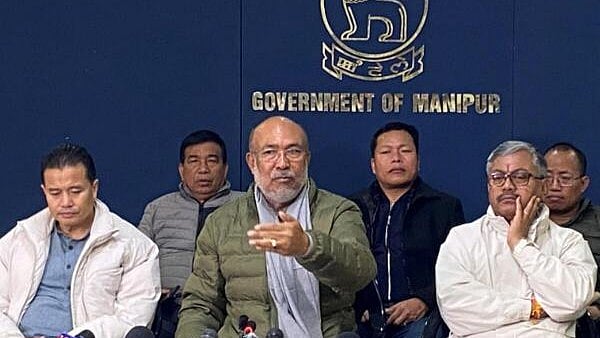
Outgoing Manipur Chief Minister N. Biren Singh addresses a press conference in Imphal
Credit: PTI Photo
After almost two years of ethnic violence between the Meiteis and Kuki-Zo people in Manipur, Chief Minister N Biren Singh has offered his resignation. Governor Ajay Bhalla has asked Biren to continue in office till his replacement is formalised. It is still unknown whether Biren will have an immediate successor or the state will be brought under President’s rule. Since May 3, 2023, ethnic violence in Manipur has resulted in more than 200 deaths and the displacement of about 60,000 people. However, Biren, despite several demands for his resignation, had refused to comply. So what forced him to resign now?
The immediate reason appears to be the decision of the Opposition Congress to bring a no-confidence motion in the State Assembly in the budget session, which was scheduled to commence on February 10. The session has since been called off by the Governor. Although the BJP has a majority on its own, according to reports, there were possibilities of a section of MLAs in the party supporting the no-confidence motion which could have resulted in the falling of the government. This prompted the BJP central leadership to force Biren to resign and the latter, left with no option to resist, agreed.
Notably, a section of BJP leaders in the state had issues with Biren’s working style – and this predates the violence. Things went further downhill for the chief minister after the violence erupted but Biren was able to hold on to the post as the party’s central leadership, aware of the internal schism, was not keen to rock the boat.
A prominent leader who reportedly pushed for Biren’s removal ahead of the budget session was Yumnam Khemchand Singh, a cabinet minister holding crucial portfolios such as Rural Development and Panchayati Raj. Khemchand himself is one of the chief ministerial contenders within the party. The other contenders for the CM post include Power Minister Thongam Biswajit Singh and Public Works Department Minister Govindas Konthoujam.
Biren Singh’s resignation is unlikely to restore normalcy immediately in the northeastern state. It is important to note that after the start of the ethnic violence, the Centre appointed Kuldiep Singh as the security advisor to the state. He has been in charge of the Unified Command which is responsible for the coordination among the different central forces and the state police. This, effectively, meant that the law and order of the state was no longer in Biren’s control. As chief minister, he was only handling the political affairs of the state.
The violence has already significantly widened the gap between the Meiteis and Kuki-Zo people. A return to the original social situation appears almost impossible now because there has been a deep polarisation along ethnic lines. The strife has also resulted in the rise of militants as a force in both communities. These militants have also been successful, to some extent, in exploiting this ethnic polarisation to increase their support among their respective communities.
There should be concerted efforts from all the stakeholders to bridge the gap between the two communities – that has to be the priority in the state’s road back to peace. For that to happen, communication channels between the two communities need to be established. The current situation cannot be solved only through action pegged to security initiatives – it will also need political solutions to address the ethnic polarisation on the ground and to achieve those solutions, dialogue becomes a non-negotiable component.
A new opportunity
One of the main reasons that caused the derailment of dialogue for reconciliation has been the continuation of Biren Singh as the chief minister. Kuki-Zo people never placed their trust in Biren whom they saw only as a ‘Meitei Chief Minister.’ When the Centre formed a 51-member peace committee in 2023, the committee failed to take off because the Kuki-Zo people objected to Biren being a member of the committee.
On the other hand, as the ethnic violence continued, a section of the Meiteis too started viewing Biren as an inefficient chief minister since he was seen as failing to protect the community’s interests. Biren’s resignation has come too late but it needs to be welcomed because it provides a fresh opportunity for the Centre to revive efforts towards normalcy in the state. With Union Home Minister Amit Shah’s aide Ajay Bhalla in the Raj Bhavan, it is time for the Centre to re-initiate dialogue. The first step could be the formation of a new peace committee.
(The writer is a political commentator and columnist)